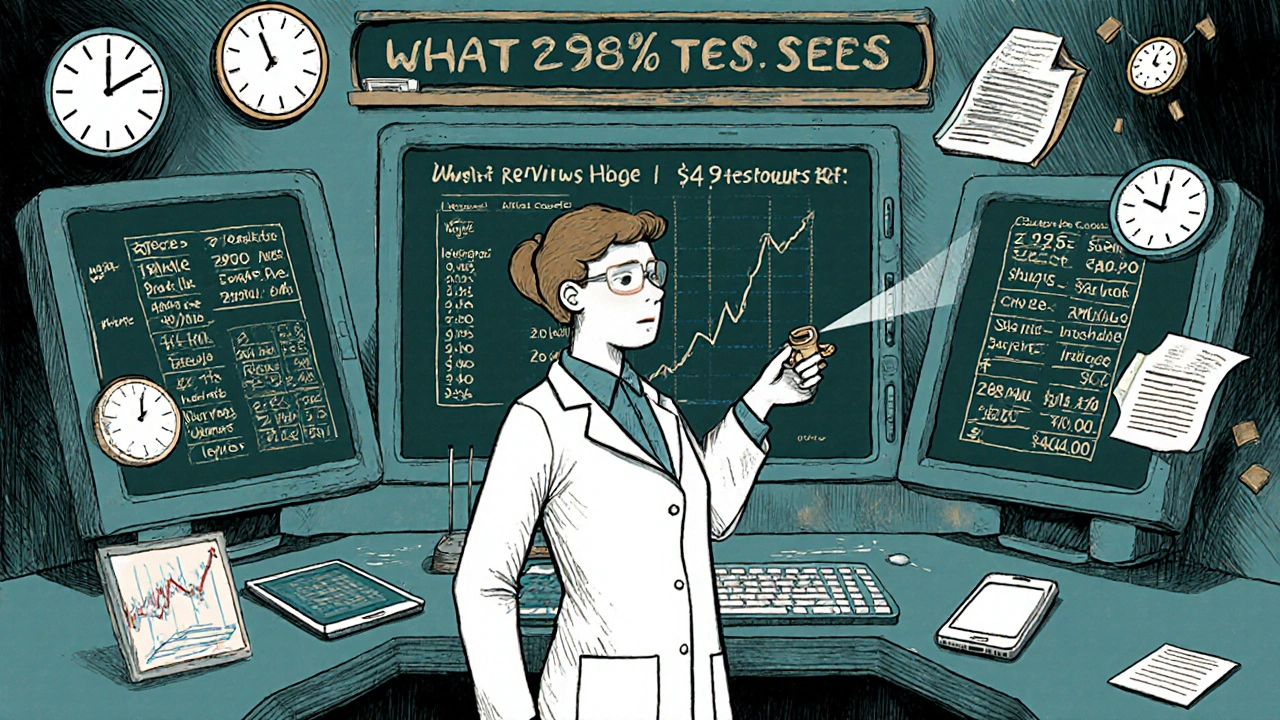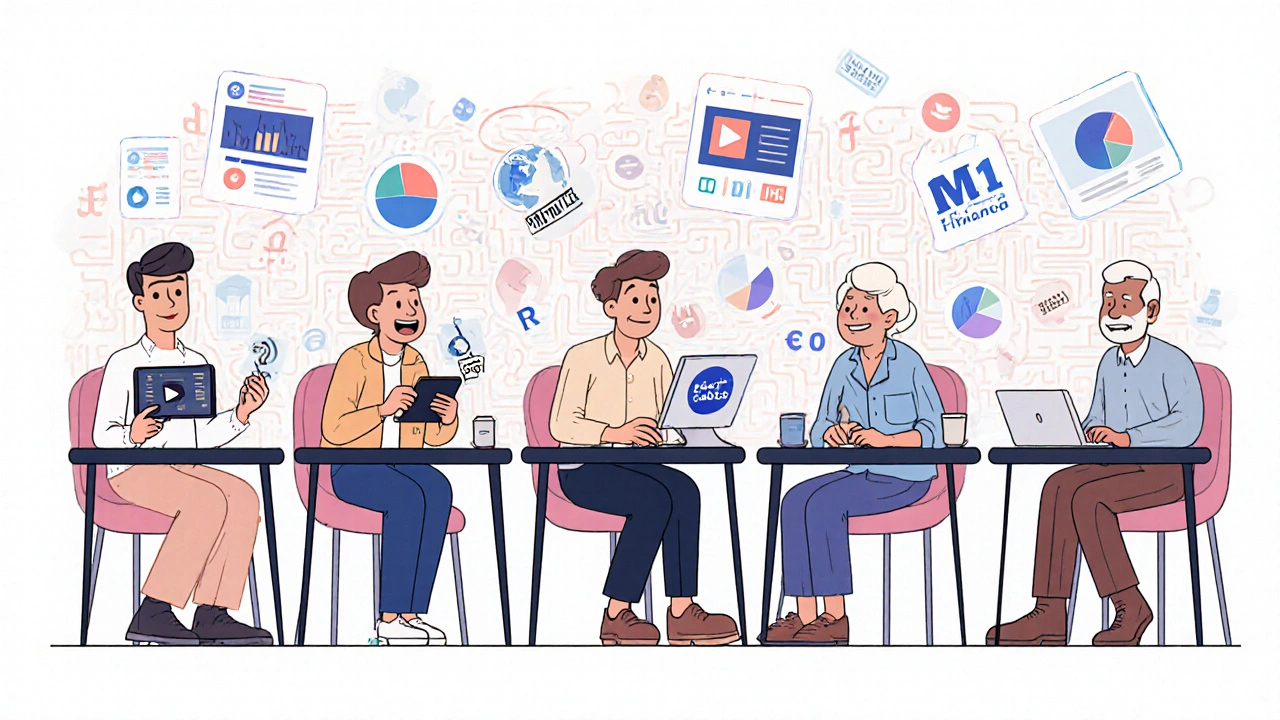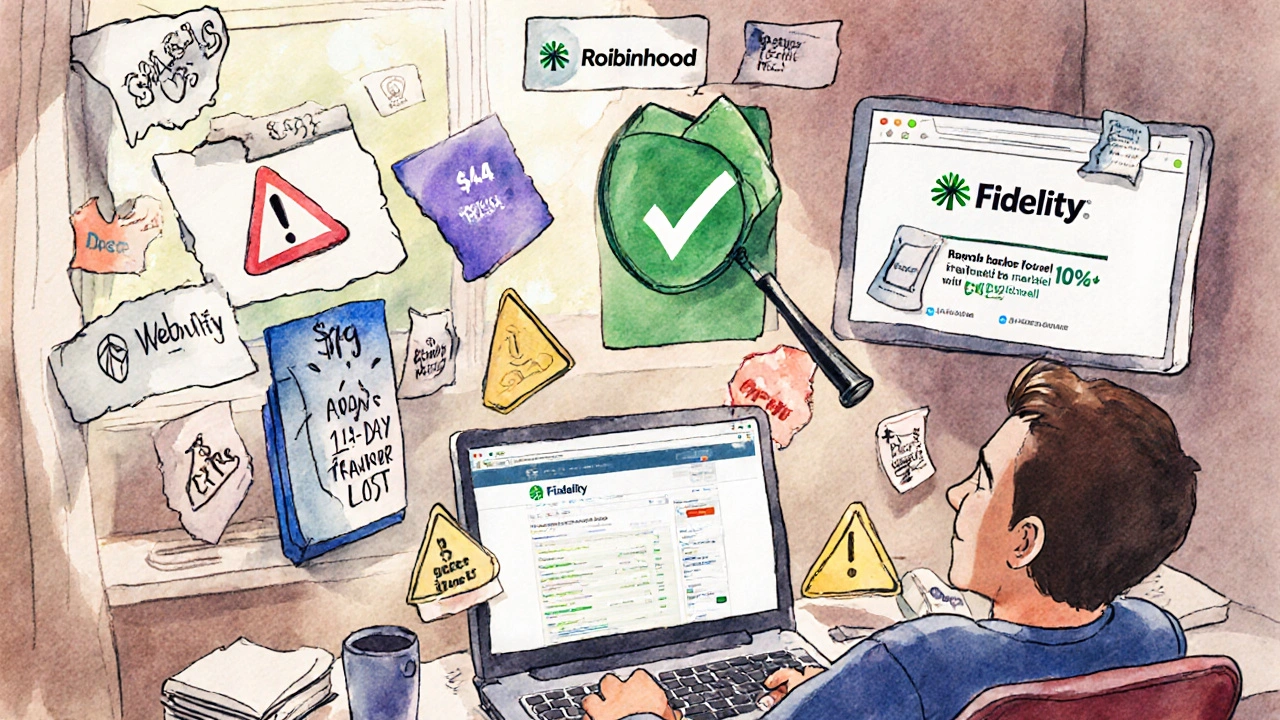Broker Comparison Tool
What type of investor are you?
Select your priorities
Recommended Brokers
Based on your selectionsNot all brokers are created equal - and ratings can save you from costly mistakes
There are over 136 million retail investors in the U.S. using online brokers, and nearly half of them picked their platform based on a flashy ad or a friend’s recommendation. That’s risky. A broker that’s perfect for day trading might crush your retirement account because it charges $49.95 for mutual funds or locks you into a 30-day hold on withdrawals. Broker ratings aren’t just reviews - they’re forensic tools that cut through marketing noise and show you what really matters.
What broker ratings actually measure (and what they hide)
Top-rated review sites like StockBrokers.com, Kiplinger, and Bankrate don’t just ask users if they like their app. They run real tests. StockBrokers.com runs 298 specific checks across six categories: trading platforms (25% weight), ease of use (20%), research (20%), mobile trading (15%), customer service (10%), and education (10%).
For example, platform stability isn’t just "does it crash?" - they track 100 consecutive trades and measure latency. The target? Under 1.2 seconds. Order execution quality is verified using SEC Rule 605/606 data, which shows how often your trade actually fills at the price you see. Mobile apps are tested on 12 different devices running iOS 17.4 and Android 14. This isn’t guesswork - it’s lab-grade testing.
But here’s what most reviews won’t tell you: many sites earn money when you sign up. The Financial Times found 60% of review platforms don’t disclose affiliate payouts. NerdWallet makes $42.70 per referral to M1 Finance. That doesn’t mean their ratings are wrong - but it does mean you need to cross-check with multiple sources.
Five must-check factors before you open an account
Forget "best overall." Your ideal broker depends on how you trade. Here’s what to dig into:
- Fees beyond commissions - Yes, stocks and ETFs are $0 everywhere now. But options contracts? Fees range from $0.50 to $1.00 per trade. Mutual funds? Some brokers charge up to $49.95 per transaction. Firstrade charges $0 for options - half the industry average.
- Research depth - Fidelity gives you access to 18 third-party research providers, including Bloomberg and Morningstar. Robinhood? One internal list with no analyst reports. If you’re not just buying and holding, research quality matters more than a slick app.
- Mobile app reliability - During market volatility, 63% of negative reviews cite app crashes. Webull handles 200 simulated trades 42% faster than Robinhood - but crashes 3x more often under stress. Test it yourself during live market hours.
- Account transfer speed - Only 43% of brokers meet the SEC’s 8-business-day standard for ACATS transfers. Fidelity averages 5.2 days. Webull? 11.7 days. If you’re switching, this could delay your trading for weeks.
- Customer service response time - Merrill Edge answers chat in 2.4 minutes on average. Webull takes over 22 minutes during market hours. If you need help at 2:30 PM on a volatile day, that gap could cost you money.

Who wins for different types of investors
There’s no single "best" broker - only the best for you.
- Beginners: Fidelity wins. $0 account minimum, fractional shares starting at $1, 100+ no-transaction-fee mutual funds, and video tutorials that actually walk you through each step. Their education pathway takes 9.2 hours - longer than Robinhood’s 4.7 hours - but users stick with it 23% longer.
- Active traders: Charles Schwab’s thinkorswim platform is the gold standard. It scored 4.8/5 for stability after 500 simulated day trades. But it’s overwhelming for new users - 273 customizable elements can paralyze someone who just wants to buy a stock.
- International investors: Interactive Brokers is the only broker offering access to 150+ global markets and 26 currency pairs. But their interface is so complex, it scores only 3.2/5 for ease of use. You’ll need patience - and maybe a tax accountant.
- Automated investors: M1 Finance nails automated rebalancing and pie-based portfolios. But it only allows trading during three market-open windows per day. If you want to react to news at 10:45 AM, you’re out of luck.
- Retirement savers: Fidelity and Schwab dominate here. Both offer $0 fees on thousands of mutual funds and IRA rollovers. Robinhood doesn’t even support IRAs with mutual funds.
The hidden traps most reviews ignore
Even the best-rated brokers have dark corners.
Interactive Brokers users report 3.2 times more tax form complications than average. TurboTax data shows 28% of IBKR users need professional tax help - compared to 8.7% industry-wide. Why? Their global trades trigger complex foreign tax reporting.
On Reddit, over 1,200 Fidelity users complained about 15+ minute hold times during market crashes. That’s not a rating flaw - it’s a capacity issue. Big brokers get overwhelmed when everyone panics at once.
And then there’s the interface trap. Professor Meir Statman’s eye-tracking studies found platforms with 50+ technical indicators increase novice trader error rates by 37%. Simplicity isn’t a feature - it’s a safety net.
One of the most overlooked issues? Tax lot selection. 18.7% of users overpay taxes because they accidentally sell the wrong shares. Schwab’s "Specific ID" method reduces this error to just 5.3%. If you’re buying and selling frequently, this matters.

What’s changing in 2025 - and what to watch for
Broker ratings are evolving fast.
StockBrokers.com now uses AI to simulate 10,000 concurrent trades during virtual market crashes. Fidelity held 99.7% order execution during these stress tests. Discount brokers like Webull and Robinhood dropped below 85%. This isn’t theoretical - it’s what happens when meme stocks spike.
Kiplinger is building real-time SEC Form CRS updates into their ratings. Brokers change fees 41% of the time each year. If a broker raises its options fee tomorrow, your "best broker" status could vanish overnight.
ESG investing is now a formal scoring category. Morningstar found 68% of millennials consider ESG options essential. Brokers that don’t offer green ETFs or socially screened portfolios are losing ground.
And the industry itself is consolidating. Gartner predicts only 5-7 major review sites will survive past 2028. Data costs have jumped 220% since 2020. The winners will be the ones with the deepest testing - not the flashiest websites.
How to pick your broker - a simple 3-step plan
- Define your trading style. Are you buying $100 of Apple stock once a month? Or trading 20 options contracts daily? Your answer determines everything.
- Match features to your needs. If you’re a beginner, prioritize education and simplicity. If you’re active, demand speed, research, and low options fees. Don’t care about global markets? Skip Interactive Brokers.
- Test before you commit. Open a free demo account. Try placing a trade during market hours. Call customer service with a fake question. See how long you wait. Try the mobile app on your phone while walking around. If it feels clunky, it’ll feel worse when you’re losing money.
Don’t chase the #1 ranking. Chase the broker that fits your life. The right platform doesn’t just make trading easier - it keeps you from making expensive mistakes.

Comments (3)
Dave McPherson
Let’s be real - most ‘broker reviews’ are just affiliate marketing in a lab coat. I’ve seen Fidelity’s ‘free’ mutual funds turn into a 2% expense ratio after 18 months of ‘promotional pricing.’ And don’t get me started on Webull’s ‘zero commission’ while they sell your order flow to Citadel like it’s bulk toilet paper. The real metric? How many times your stop-loss gets gamed by HFT bots during a Fed announcement. If your broker doesn’t publish their payment-for-order-flow disclosures in bold, red, flashing neon, you’re not investing - you’re donating to Wall Street’s lottery system.
And yes, I’ve tested 12 platforms during the March 2020 meltdown. Only Schwab’s thinkorswim didn’t turn into a buffering loading screen. The rest? Glitched like a Windows 95 dial-up modem during a thunderstorm. If you’re still using Robinhood because ‘it looks cool,’ you’re one margin call away from selling your kidneys to cover a $47 options spread. Wake up, people.
Also - tax lot selection? Most platforms hide it behind three menus and a captcha. Schwab’s Specific ID is the only thing that keeps me from accidentally selling my 2018 Tesla shares instead of my 2021 ones. That’s not a feature - it’s a tax-saving lifesaver. And no, I don’t work for Schwab. I just refuse to pay the IRS extra because some app designer thought ‘advanced’ meant ‘overwhelming.’
RAHUL KUSHWAHA
Thank you for this. 🙏
I’m from India, and I’ve been trying to find a broker that works for long-term investing without hidden fees. Most sites only talk about US platforms, but your breakdown of research depth and transfer speed helped me realize why my current broker (Zerodha) is actually better than I thought - even if it doesn’t have 200 indicators. Simplicity > noise.
I’ll test Fidelity’s demo next week. Your 3-step plan is the first clear guide I’ve seen that doesn’t sound like an ad. 🌱
Julia Czinna
One thing I’d add - and I’ve seen this firsthand with my dad who’s retiring - is that customer service isn’t just about response time, it’s about whether the rep actually understands what you’re asking.
I called Merrill Edge last year because I couldn’t figure out how to transfer an IRA from my old 401(k). The first rep read me a script. The second one said, ‘Oh, you mean the rollover form? Here’s the PDF, and I’ll email you a checklist.’ Took five minutes. No bots. No hold music. That’s the difference between a service and a sales funnel.
Also, the ESG point is huge. My niece just opened her first account and asked if she could avoid fossil fuels. Only three brokers made that easy. The rest made her dig through five submenus and then gave her a list of 87 ETFs labeled ‘socially responsible’ - 72 of which still held Exxon. That’s greenwashing with a UI.
And to Dave - you’re not wrong about order flow. But I’d argue the bigger trap is emotional design. Apps that use green for ‘buy’ and red for ‘sell’ are literally training people to treat investing like a slot machine. The best platforms don’t just execute trades - they reduce impulse. That’s why Fidelity’s education takes longer. It’s not a bug. It’s a feature.
Test the demo. Talk to a real person. And if the app makes you feel like you’re winning a game when you buy a stock… walk away. You’re not playing. You’re being played.